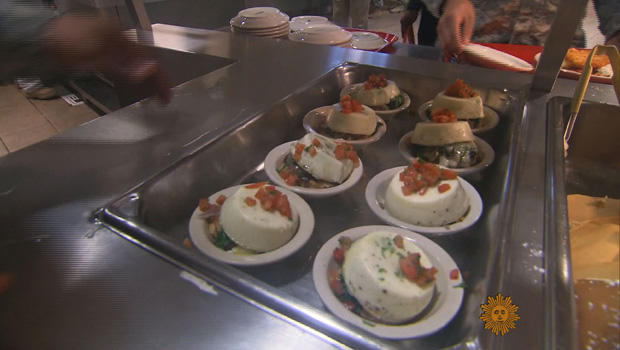How to feed an army its veggies and quinoa
Some 40,000 Americans in the military will be having Christmas dinner in Afghanistan this Wednesday. But wherever our fighting forces may be, feeding an army can pose quite a challenge. Here's David Martin:
At Fort Bragg, home of the 82nd Airborne, the day starts before dawn, and could end with a night jump. In-between, soldiers pack in the calories needed to fuel all that activity.
Words like "chow" and "mess hall" don't do justice to the way soldiers eat these days.
"It has changed tremendously since the time when I was a private," said Sgt. Major Samuel Jones, who joined the Army back when meals really were taken in a "mess hall." Now it's called a "dining facility," and on this day it's Soul Food Day.
"They take pride in making the macaroni, the sweet potatoes, the collard greens," said Jones. "And you can feel the love when you bite into the food."
But a lot of it is fried, and the macaroni comes with extra cheese. Sgt. Major Scott Dugan showed Martin how the food line is color-coded: green = low in calories, high in nutrition. Red = high in calories, low in nutrition.
"It makes it easier for soldiers to kind of figure out what are the healthiest items for them to eat," said Dugan.
It starts green with corn and collard greens, but goes red with fried chicken and ribs.
"People are drawn to these foods here," Martin noted of the "reddish" items, "because they taste better."
"Oh absolutely, absolutely, they do taste better," said Dugan. "Which is why we've kind of front-loaded the line with the more healthy items, because research shows that whatever I'm offered first, I'm going to take the most of it."
Our research on Soul Food Day showed most soldiers went for the red -- their plates piled high with everything a healthy eater should be wary of.
How do you change that? "Well, next time they do a soul food meal you'll see some different items out here; they won't be exactly these same items," Dugan said.
That's because the Army has called in the CIA -- as in the Culinary Institute of America, which Julia Child once called the Harvard of cooking schools.
Master chef Brad Barnes has come to Fort Bragg to renovate the menu: "We specialize in bringing really top-quality food and presentation into a volume setting," he said.
Offered up: Roasted cauliflower soup and toasted almonds.
"One of the things that I think is a real opportunity to do better in the military system is to increase the amount of fresh vegetables from frozen, from canned, to increase the amounts of grains, fruits, nuts that are offered," Barnes said.
The fruits are in plain sight, but Barnes says there's a covert side to this operation, what he called "stealth health": "Because we're going to sneak something really good in here and nobody will never know it."
He's also making a chutney with apples, pineapple juice, spices and one secret ingredient: Quinoa.
Lt. Gen. Joseph Anderson, the top officer at Fort Bragg, has never heard of the superstar grain from Peru. Barnes explained that the quinoa will "just kind of disappear" into the relish, making it relatively unrecognizable while adding texture.
"It'll be there, and folks will start eating quinoa," he said.
It's also being added to the pancakes.
You've heard of a bull in a china shop? How about a paratrooper in a kitchen?
Lt. Gen. Joseph Anderson quizzed Barnes about the Buckwheat Orange Salad. "Is that that Peruvian stuff again?" he asked.
"No, that's Kasha. That's all-American. That's buckwheat," Barnes replied.
Lisa Brefere is the CIA chef in charge of overhauling breakfast. Pancakes and sausages are still on the menu.
"I never think of sausage as healthy," said Martin.
"We're going to use turkey sausage," Brefere said. "We're going to season it with some cumin and cayanne and hot peppers so it has a little bit of kick to it."
"Are you going to tell them it's turkey sausage?"
"Not unless they ask," she replied.
Anderson knows if he shuts down the line for chili dogs and cheese burgers his soldiers will head for one of the fast food outlets on the base.
"This is the Army -- why can't you just order them to eat spinach?" Martin said.
"Wouldn't that be nice?" responded the general. "If a soldier chooses to eat it, no one's going to tell him that he can't eat it. The goal is to try and show him the benefits of eating a healthier lifestyle."
In the Army staying fit is part of the lifestyle, and part of the job. There are only about 13,000 overweight soldiers, a tiny percentage of the total 535,000 on active duty.
"It's not an obesity problem per se," said Lt. Gen. Anderson. "It's how food is a better complement to your routine and what the nutrients will do to provide you the capability to run faster, to rucksack longer, to jump out of an airplane and hit the ground and not fall apart."
One thing you won't find at a Burger King is Sherred Eggs Over Spinach and Turkey Sausage (left).
A survey taken later that day found nearly two-thirds of the soldiers chose healthy items.
But we're not sure how to count Private James Jackson, who topped his whole wheat French toast with, yes, chocolate.
And what about Specialist Ryan Pelzer's custom-made Army McMuffin? He says it's healthy because those are egg whites on top of the pork sausage and hash browns.
For more info:
